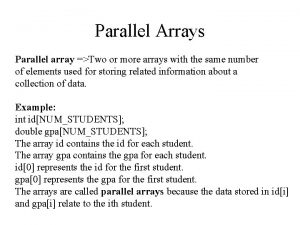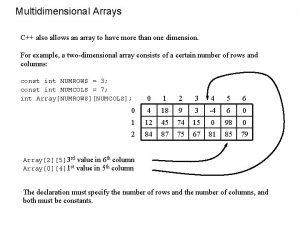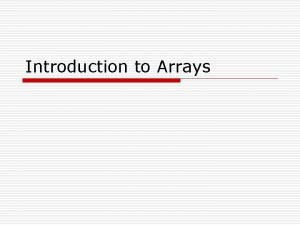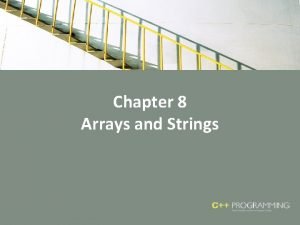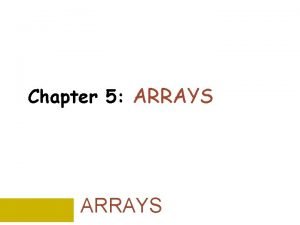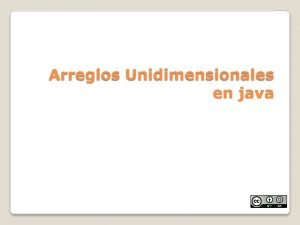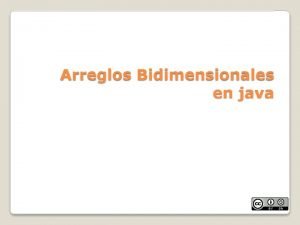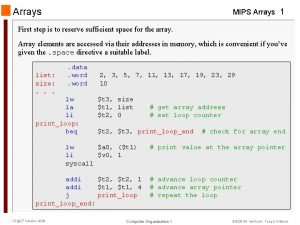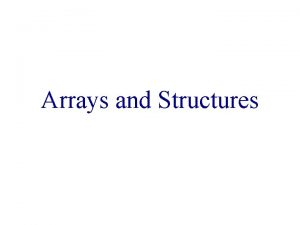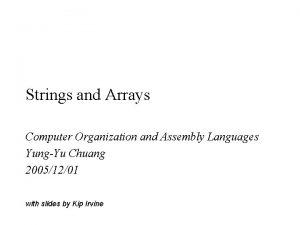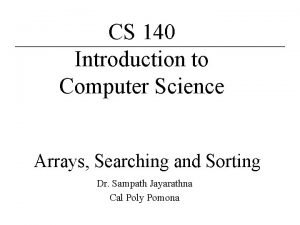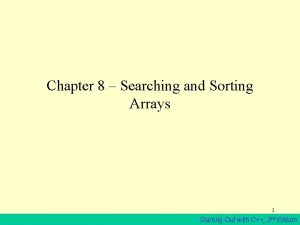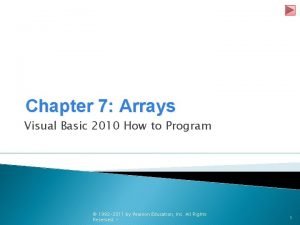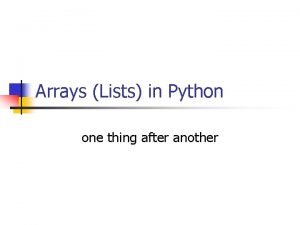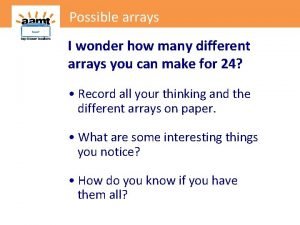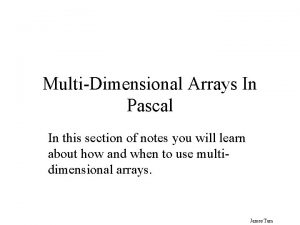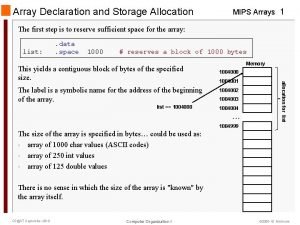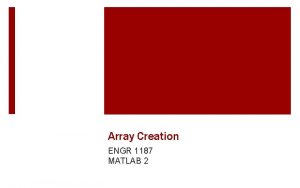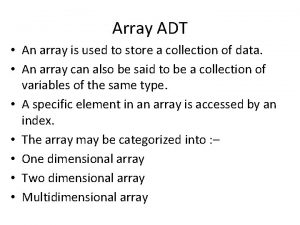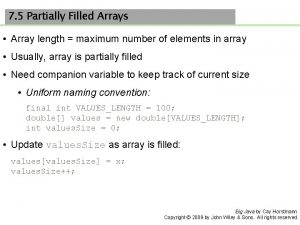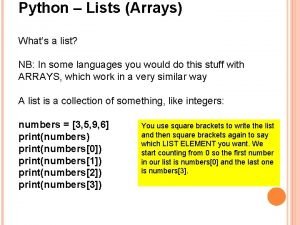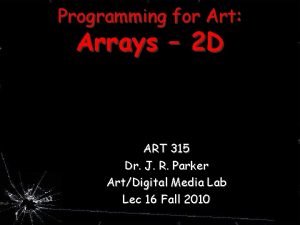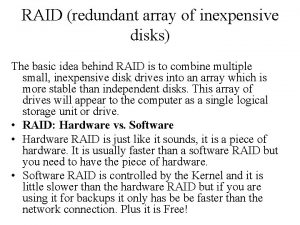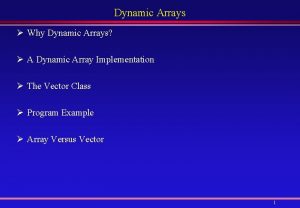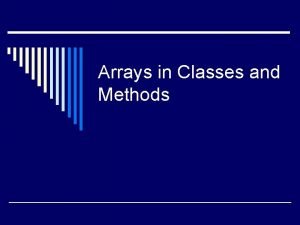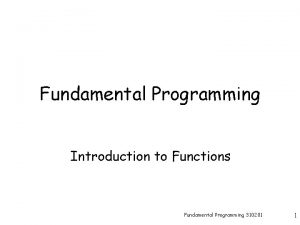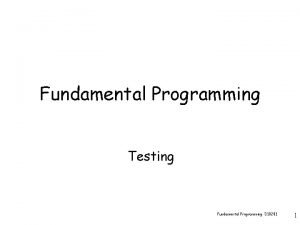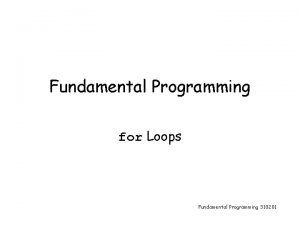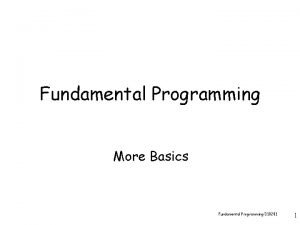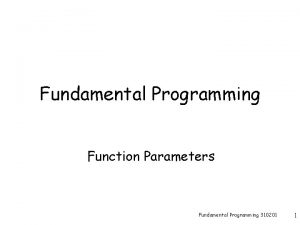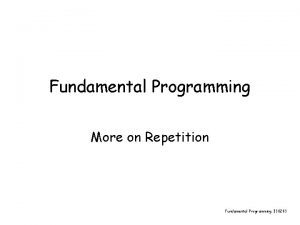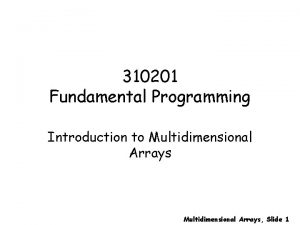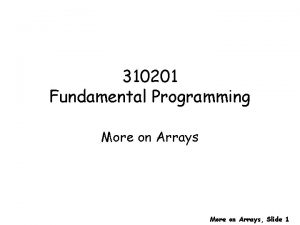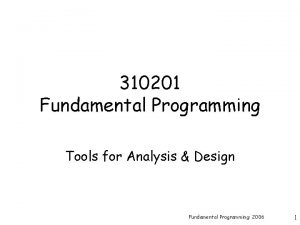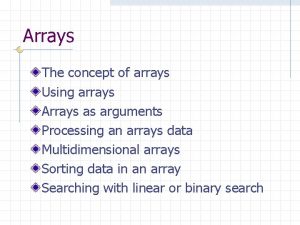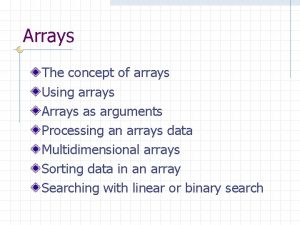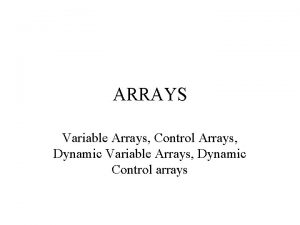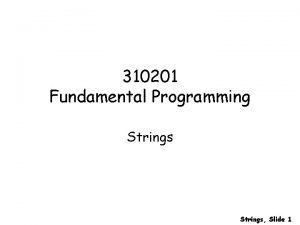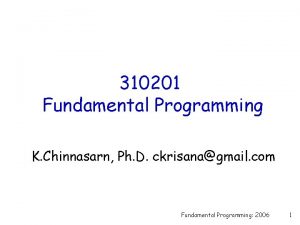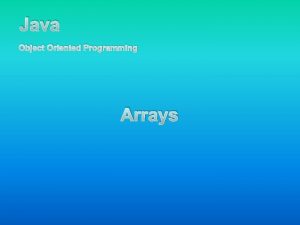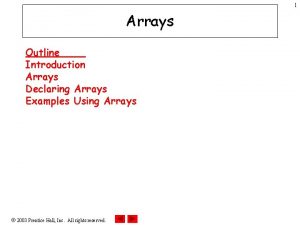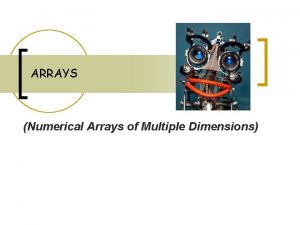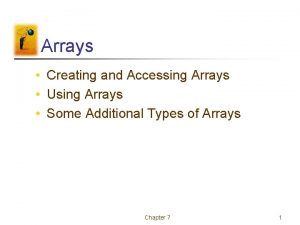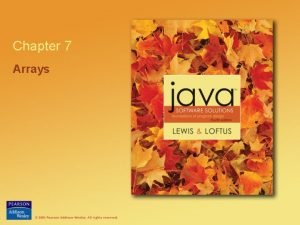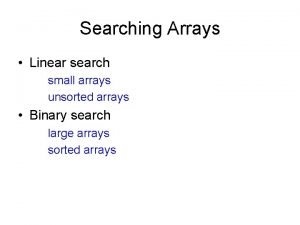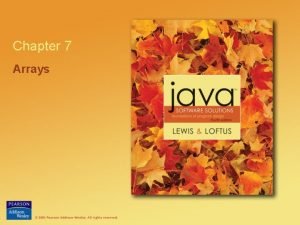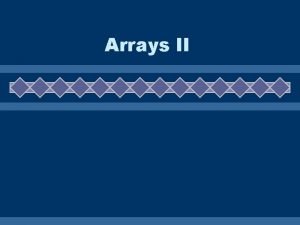310201 Fundamental Programming Introduction to Arrays 310201 Fundamental











![Arrays • we assign values to an array using the same notation: read Marks[0] Arrays • we assign values to an array using the same notation: read Marks[0]](https://slidetodoc.com/presentation_image_h2/57d040b26985fd6581efb580eeca89ce/image-12.jpg)





















- Slides: 33

310201 Fundamental Programming Introduction to Arrays 310201: Fundamental Programming

Arrays • in this class we introduce the last substantial topic in the course • the idea is quite simple – to begin, let’s go back to the beginning… 310201: Fundamental Programming

Variables write “Number of marks in exam ==> “ read Nbr. Marks write “Student’s mark ==> “ read Student. Mark set Percentage to 100 * Student. Mark / Nbr. Marks write “ Student’s percentage: “ write Percentage this design uses 3 variables: Nbr. Marks, Student. Mark, Percentage 310201: Fundamental Programming

Variables write “Number of marks in exam ==> “ read Nbr. Marks write “Student’s mark ==> “ read Student. Mark set Percentage to 100 * Student. Mark / Nbr. Marks write “ Student’s percentage: “ write Percentage this design uses 3 variables: Nbr. Marks, Student. Mark, Percentage 310201: Fundamental Programming

Variables write “Number of marks in exam ==> “ read Nbr. Marks write “Student’s mark ==> “ read Student. Mark set Percentage to 100 * Student. Mark / Nbr. Marks write “ Student’s percentage: “ write Percentage this design uses 3 variables: Nbr. Marks, Student. Mark, Percentage 310201: Fundamental Programming

Variables • each variable can hold a single value • each variable is associated with a single memory location • after running this program with the following inputs. . . 310201: Fundamental Programming

Programs Number of marks in exam ==> 50 Student's mark ==> 30 Student's percentage: 60 310201: Fundamental Programming

Variables • after running this program with the previous inputs. . . • the memory locations used by this program hold the following values. . . Nbr. Marks: 50 Student. Mark: 30 Percentage: 60 • each variable is associated with one memory location and can hold one value 310201: Fundamental Programming

Arrays • an array is a variable that can hold more than one value • An array is a series of elements of the same type placed in contiguous memory locations that can be individually referenced by adding an index to a unique identifier. • an array called Marks might hold the collection of marks from an exam • we refer to values in an array using square brackets and a position number of the value of interest: Marks[1] Marks[17] Marks[123] 310201: Fundamental Programming

Arrays • in some languages, the first value in an array is at position 1 • however, in C++, the first value in an array is at position 0 • in pseudocode examples, we will adopt this 0 -based convention Marks[0] Marks[1] Marks[2] first value held in Marks second value held in Marks third value held in Marks 310201: Fundamental Programming

Arrays • to display the first three values in Marks, we can write (in pseudocode): write Marks[0] write Marks[1] write Marks[2] • we’ll look at arrays in C++ in detail later – to output array values we write: cout << Marks[0]; cout << Marks[1]; cout << Marks[2]; 310201: Fundamental Programming
![Arrays we assign values to an array using the same notation read Marks0 Arrays • we assign values to an array using the same notation: read Marks[0]](https://slidetodoc.com/presentation_image_h2/57d040b26985fd6581efb580eeca89ce/image-12.jpg)
Arrays • we assign values to an array using the same notation: read Marks[0] (read value and assign as first in Marks) set Marks[5] = 0 (assign sixth value in Marks to 0) • no surprises here in C++: cin >> Marks[0]; Marks[5] = 0; 310201: Fundamental Programming

Arrays • the power of arrays comes from the ability to refer to values stored in an array using a variable ( display first mark ) set Mark. Nbr = 0 write Marks[Mark. Nbr] ( display second mark ) set Mark. Nbr = 1 write Marks[Mark. Nbr] 310201: Fundamental Programming

Activity • if Marks holds the values shown on the right, what output will the following design produce? set Nbr. Marks = 3 set Mark. Nbr = 0 while Mark. Nbr < Nbr. Marks write ”Mark number “, Mark. Nbr, ” = “ write Marks[Mark. Nbr] write New. Line set Mark. Nbr = Mark. Nbr + 1 ( end of loop over marks ) Marks [0] 17 [1] 29 [2] 8 310201: Fundamental Programming

Activity Break 310201: Fundamental Programming

Activity Feedback • if Marks holds the values shown on the right, this design will produce the following output? Marks Mark number 0 = 17 Mark number 1 = 29 Mark number 2 = 8 Marks 17 29 [0] [1] [0] 17 [1] 29 [2] 8 8 [2] 310201: Fundamental Programming

Array References • below, a variable is used to refer to the values of interest in an array read Mark[Student. Nbr] set Percentages[Student. Nbr] to Percentage • a useful convenience is that we can use an expression to refer to the values of interest in an array set Mark[Student. Nbr] to Mark[Student. Nbr + 1] • why is this useful? . . . 310201: Fundamental Programming

Array References • Because we can now do something like for (i=0; i<5; i++) { cout << “Mark for next student? “; cin >> mark[i] } 310201: Fundamental Programming

Implementing Arrays in C++ • let’s have a look at the basics of using arrays in C++ - we’ll look at: – declaring arrays – initialising arrays • we’ve already seen examples of how arrays are used in C++, more follow… • in the next class we’ll learn some more details about using arrays in C++ 310201: Fundamental Programming

Declaring Arrays in C++ • no surprises in declaring arrays – below we declare an array to hold 10 integers: int Results[10]; • as mentioned, our ten integers are held in positions 0 to 9: Results[0] Results[1] Results[2] : Results[9] 310201: Fundamental Programming

Declaring Arrays in C++ • a constant is sometimes used to hold the number of values in an array const int NBR_RESULTS = 10; int Results[NBR_RESULTS]; • a constant is useful when looping, and also makes it easy to change the array size: for (Result. Nbr = 0; Result. Nbr < NBR_RESULTS; Result. Nbr++) cout << “Result[“ << Result. Nbr << “]: “ Results[Result. Nbr] 310201: Fundamental Programming

Declaring Arrays in C++ • take care with loop conditions – one common form is: for (Result. Nbr = 0; Result. Nbr < NBR_RESULTS; Result. Nbr++) : • an alternative form is: for (Result. Nbr = 0; Result. Nbr <= NBR_RESULTS - 1; Result. Nbr++) : 310201: Fundamental Programming

Initialising Arrays in C++ • to initialise values in an array, enclose the initial values in braces: const NBR_RESULTS = 3; int Results[NBR_RESULTS] = {0, 1, 2}; • you can initialise all values in an array of integers to zero using: int Results[NBR_RESULTS] = {0}; the default initial value for an array of integers is zero – if you do not provide enough initial values, others are set to zero! 310201: Fundamental Programming

Debugging • to debug looping logic effectively, you need to know how to set watches and to step through a loop 310201: Fundamental Programming

More on Initialising Arrays • if the array size is omitted when it is declared, the compiler can automatically determine the size from initial values int Primes[] = {1, 3, 5, 7, 11}; • is equivalent to int Primes[5] = {1, 3, 5, 7, 11}; 310201: Fundamental Programming

More on Referencing Arrays • we normally use an integer literal, or an integer variable, to refer to a value of interest in an array Results[0] Results[Result. Nbr] • also, an integer expression can be used Results[Current. Pos - 1] 310201: Fundamental Programming

A Common Error Using Arrays • a common error when using arrays is to refer to an element that does not exist • that is: to use an index value that is outside the acceptable range. . . 310201: Fundamental Programming

Activity • can you see how this code refers to an array element that does not exist? const NBR_RESULTS = 3; int Results[NBR_RESULTS] = {0}; for (int Result. Nbr = 0; Result. Nbr <= NBR_RESULTS; Result. Nbr++) cout << Results[Result. Nbr]; 310201: Fundamental Programming

Activity Break 310201: Fundamental Programming

Activity Feedback • in the last trip through the loop below, the code refers to Results[3], which does not exist const NBR_RESULTS = 3; int Results[NBR_RESULTS] = {0}; for (int Result. Nbr = 0; Result. Nbr <= NBR_RESULTS; Result. Nbr++) cout << Results[Result. Nbr]; 310201: Fundamental Programming

A Common Error Using Arrays • C++ does not give an error when using an index value that is out-of-range • it is the programmer’s responsibility to ensure that array references are always within the acceptable range • if, in an expression, you refer to an array element that does not exist: • results are unpredictable – the program may give erroneous output, or go into an infinite loop 310201: Fundamental Programming

A Common Error Using Arrays • if you assign a value to an array element that does not exists: • with luck, you’ll get a memory violation error – so you know there’s a problem • without luck, results are unpredictable: • erroneous output produced • infinite loops lock-up the program • memory used by the operating system is overwritten causing a system crash 310201: Fundamental Programming

Summary • simple variables hold a single value • arrays hold a collection of related values • first value in a C++ array is at position 0 • arrays can be defined for any of the basic data types – char, int, double, float 310201: Fundamental Programming
 Parallel arrays python
Parallel arrays python Array of arrays c++
Array of arrays c++ Parallel arrays
Parallel arrays Partially filled arrays
Partially filled arrays C++ parallel arrays
C++ parallel arrays Why do we need arrays?
Why do we need arrays? Dynamic arrays and amortized analysis
Dynamic arrays and amortized analysis Arreglos unidimensionales en java
Arreglos unidimensionales en java Java arreglos bidimensionales
Java arreglos bidimensionales Arrays mips
Arrays mips Polynomial representation using array in c
Polynomial representation using array in c Arrays in arm assembly
Arrays in arm assembly Global arrays in c
Global arrays in c Computer science arrays
Computer science arrays Searching and sorting arrays in c++
Searching and sorting arrays in c++ Arrays visual basic
Arrays visual basic Python find index of max
Python find index of max Array advantage and disadvantage
Array advantage and disadvantage I wonder is it possible
I wonder is it possible 2d array pascal
2d array pascal Dynamic array mips
Dynamic array mips Creating arrays matlab
Creating arrays matlab Array adt
Array adt Partially filled array
Partially filled array Redundancy array of independent disk
Redundancy array of independent disk Python list of arrays
Python list of arrays Arrays
Arrays Day 3: arrays
Day 3: arrays Redundant arrays of inexpensive disks
Redundant arrays of inexpensive disks Small basic array examples
Small basic array examples Dynamic p table
Dynamic p table Microled arrays
Microled arrays Are vectors dynamic arrays
Are vectors dynamic arrays Facts about arrays
Facts about arrays
